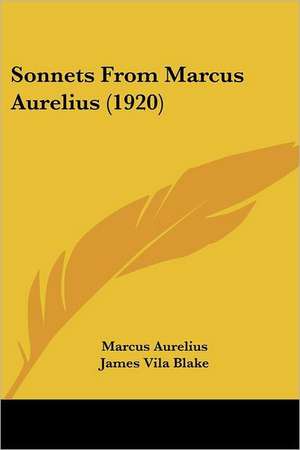Sonnets From Marcus Aurelius (1920)
Autor Marcus Aurelius Editat de James Vila Blakeen Limba Engleză Paperback – oct 2008
This scarce antiquarian book is a facsimile reprint of the original. Due to its age, it may contain imperfections such as marks, notations, marginalia and flawed pages. Because we believe this work is culturally important, we have made it available as part of our commitment for protecting, preserving, and promoting the world's literature in affordable, high quality, modern editions that are true to the original work.
Preț: 157.69 lei
Nou
30.18€ • 31.18$ • 25.12£
Carte tipărită la comandă
Livrare economică 21-27 martie
Specificații
ISBN-10: 1437030890
Pagini: 76
Dimensiuni: 152 x 229 x 4 mm
Greutate: 0.13 kg
Editura: Kessinger Publishing
Notă biografică
Marcus Aurelius (26 April 121 - 17 March 180) was Roman emperor from 161 to 180 and a Stoic philosopher. He was the last of the rulers known as the Five Good Emperors, and the last emperor of the Pax Romana, an age of relative peace and stability for the Roman Empire. He served as Roman consul in 140, 145, and 161. The son of the praetor Marcus Annius Verus (III) and the wealthy heiress Domitia Lucilla, Marcus was raised by his grandfather, Marcus Annius Verus (II), after his father died. His uncle, Antoninus Pius, adopted him shortly before becoming emperor in 138. Now heir to the throne, Marcus studied Greek and Latin under tutors such as Herodes Atticus and Marcus Cornelius Fronto. He kept in close correspondence with Fronto for many years afterwards. Marcus married Antoninus' daughter Faustina in 145. Antoninus died following an illness in 161. The reign of Marcus Aurelius was marked by military conflict. In the East, the Roman Empire fought successfully with a revitalized Parthian Empire and the rebel Kingdom of Armenia. Marcus defeated the Marcomanni, Quadi, and Sarmatian Iazyges in the Marcomannic Wars; however, these and other Germanic peoples began to represent a troubling reality for the Empire. He modified the silver purity of the Roman currency, the denarius. The Antonine Plague broke out in 165 or 166 and devastated the population of the Roman Empire, causing the deaths of five million people. Marcus died at the age of 58 on 17 March 180 due to natural causes in the city of Vindobona (modern Vienna). He was immediately deified and his ashes were returned to Rome, where they rested in Hadrian's mausoleum. During his lifetime Marcus acquired the reputation of a philosopher king, and the title would remain after his death.
